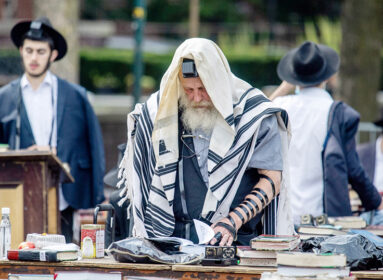By Debbie Levison
Four years ago this month, I spent a week in the Israeli Defense Forces, sleeping in a drafty trailer, showering amongst cockroaches, working back-breaking hours in a warehouse and falling onto the lumpy mattress of a rickety metal bunk bed each night.
It was the best week ever.
I was participating in Sar-El, an international program in which people volunteer for the Israeli army. My group ranged in age from 18 to 75 and included Australians, Germans, Swedes, Russians, Brits and other North Americans, including a stunning Filipino girl. Half the group was not Jewish, but all were united by a common wish to assist Israelis as rockets were falling in the south.
We were tasked with assembling kit bags for soldiers — duffels packed with a towel, soap, underwear, socks, and, as often as possible, a handwritten note of encouragement.
Everywhere I went on the base, curious boy and girl soldiers asked me, “Milu’im?”
I smiled and shook my head, tremendously proud to be mistaken for a reservist in the IDF.
What other army sends thousands of text messages and drops planeloads of leaflets, begging civilians to avoid the vicinity of Hamas operatives and specifying locations of impending strikes? Spends millions of dollars on high-tech systems to accurately pinpoint terrorists and minimize casualties? Aborts missions when pilots spot civilians near a target? And, most recently, engages in “roof knocking” — loud but benign noisemakers on rooftops that warn civilians they are near a strike zone, giving them time to leave?
When I replied “volunteer,” these soldiers were incredulous, so accustomed were they to world condemnation no matter what they did. It was hard for them to imagine people like me, leaving their families and jobs, streaming in from the four corners of the globe to do whatever we could to help. And stream we did, knowing that the menial tasks we performed meant that a real soldier would be freed for the more critical work of defending Israel’s people.
And who were these soldiers? I watched them as they arrived at the induction center, stepping off the buses, their young faces anxious but determined. I couldn’t help but think of American kids at the same tender age of 18, their greatest concerns for an upcoming intro-to-psych class or what to wear to a freshman frat party. These Israeli teens were far more concerned about abductions, infiltrations, and where the nearest bomb shelter might be at any given moment.
I had brought an entire suitcase of Halloween candy to distribute on the base. The joy these token sweets invoked was heartrending. But the most poignant moment by far was when I was asked to hoist the Israeli flag at a morning assembly. Here I was, the daughter of Holocaust survivors whose entire families had perished at the hands of the same evil that exists today: nations bent on destruction of Jews. My parents could not have imagined, given the horrors they endured, that the Jewish people would survive and flourish.
I know it’s not feasible for everyone to jump on a plane and participate in Sar-El. But what people can do, and should do, is separate the facts from the propaganda in the current conflict.
Let’s be clear: it is not about occupation; there has been no Israeli presence in Gaza for years. It’s not about blockades; even now, in the face of thousands of rockets raining down on its population, Israel sends truckloads of food, medicine and supplies to the Palestinians each week. It’s about an Iranian-backed terrorist organization whose charter remains: destroy Israel. And it’s about one side trying to defend civilians, while the other side targets them.
As I think back to that flag I raised, fluttering above the heads of conscripts straight-backed and strong, and to the mountain of 8,000 kit bags we filled that week, I recall the words first uttered by Golda Meir and now repeated by every Israeli citizen: “We can forgive them for
killing our children. But we cannot forgive them for making us kill theirs.”
Debbie Levison lives in Trumbull and is a member of Congregation Beth El in Fairfield.








 Southern New England Jewish Ledger
Southern New England Jewish Ledger












